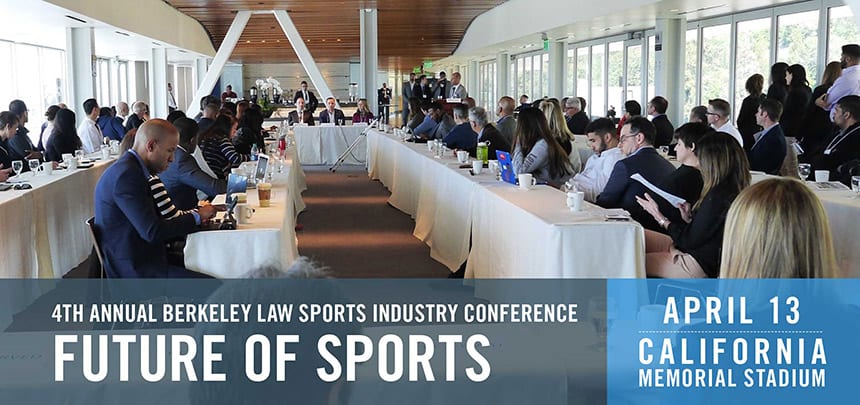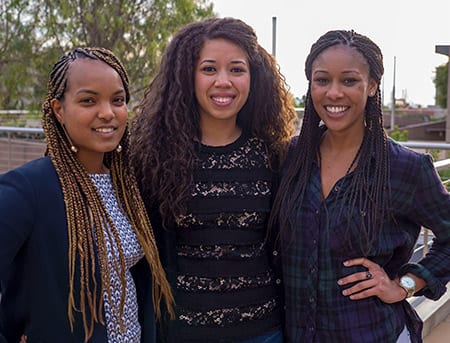
By Rachel DeLetto
Off the courts and playing fields, white males dominate the multi-billion dollar sports industry. But that hardly intimidates three African-American Berkeley Law women interested in pursuing this exciting area of law.
As co-editors-in-chief and managing editor of the Berkeley Journal of Entertainment and Sports Law (BJESL), Samya Abdela ’18, Chante Westmoreland ’18, and Drew Washington ’19, respectively, are the only all-female, all women of color board at any Berkeley Law journal.
In addition to juggling management of the journal’s 50-student staff, their classes, internships, moot court, pro bono work, and time contributing to other student organizations, the trio also organized the journal’s annual Sports Industry Conference.
The April 13 event, held at California Memorial Stadium, is one of the nation’s premier sports law and business convenings. Now in its fourth year, the conference draws hundreds of industry lawyers, executives, professionals, and students for a full day of panels addressing cutting-edge issues in sports.
“The opportunity to put on a huge conference that has nationwide recognition is a big deal for us,” says Abdela. “When these major industry professionals come to Berkeley, one of the preeminent law schools in the country, and see three women that look like us in a position where they might expect to see other people in charge, that’s really powerful.”
Vast scope of sports law
Lawyers and law students often don’t appreciate the many opportunities that exist in the sports industry. It wasn’t until Abdela met David Kelley, general counsel and vice president for the Golden State Warriors, at a California Bar Foundation event that she began to see career potential.

“Sports law is so broad,” she says. “Contracts, labor and employment issues, intellectual property rights, distribution and media agreements, sponsorship and vendor agreements… You’re doing work that you might do for any other client base, but you get to do this work within the vibrant world of athletics.”
“You have the team side, the league side, the production side, the entertainment side,” adds Washington. “You also have the player representation side and the collective bargaining agreements for the player’s associations.”
For Westmoreland, “knowing the legal considerations that go into it on the back end really makes you appreciate the game in a different way when you watch on TV or go to a stadium.”
Unique convening
The three students agree that the lack of widespread awareness of this practice area results in limited access to forums for professionals to meet and discuss key issues in the industry.
That’s where the Sports Industry Conference shines. Each year its planning committee, comprised of six students this year, must decide what to cover in the vast sports law landscape.
This year’s conference will focus on the future of sports. Highlights of the packed program include keynote addresses on the future role of the sports general counsel with LA Dodgers GC Sam Fernandez; an Oakland Athletics roundtable with COO Chris Giles, VP of Business Ops and Strategy Ashwin Puri, and Assistant General Counsel D’Lonra Ellis; and social justice activism in sports with Bay Area native Marc Spears, senior NBA writer for ESPN’s “The Undefeated.”
Berkeley Law alumnus Rodney Gilmore ’86, ESPN football analyst and of counsel at Doty, Barlow, Britt & Thieman, and attorney Tiffany Porter will discuss the state of NFL concussion cases, including the eligibility process, effects of the latest CTE findings, and delayed payouts.
The program also includes two novel areas that expand the industry even further: e-sports and sports gambling. See the full schedule.
It’s a small world
As broad as sports law may be in practice, it is heavily relationship-based. “Networking is huge, especially being women of color,” Westmoreland says.
Abdela points to her ongoing mentorship relationship with Kelley, and landing an internship at the Pac-12 Conference this semester after meeting two lawyers who work there at last year’s conference.
While organizing the conference is taxing, Washington says it offers “free reign as a student who’s interested in this area to reach out to anyone you could want to talk to in the industry with the Berkeley brand behind you. If you’re a student here and you want to go into sports law, working on this conference is the best way to get industry experience and make connections.”
And a good way to get a leg up in the job market, says Washington, who recently went through on campus interviews.
“Companies and firms want to see that you have a genuine interest in the sports and entertainment industry, and sometimes that’s hard to convey,” she says. “The fact that I helped plan this conference and work on this journal shows that I understand the legal landscape of this industry… I’m aware of the relevant issues going on, and I’m not just trying to do this because I’m interested in meeting athletes.”
Abdela, Washington, and Westmoreland all emphasized that they drew enormous benefit from mentors along the way, but that female mentors, especially women of color, are few and far between in the sports industry. Says Westmoreland, “I wouldn’t be where I am today without the support of my mentors. I’m really looking forward to paying it forward to help future Berkeley Law students.”
This year, BJESL coordinated with Professor Molly Van Houweling and launched a Cal mentorship program in which journal members act as mentors for undergraduate student athletes interested in pursuing a legal career.
That’s also why Abdela has focused on increasing female and minority participation in the conference, to show students and other attendees that they can also excel in sports law. “In the past we only had one or two women and maybe four people of color per conference. This year we have six men of color and seven women speaking at the conference.”